Over 30 years of anarchist writing from Ireland listed under hundreds of topics
September 2011
Nelson McCausland 'one strike and your out’ policy for anyone accused of ‘benefit fraud’
Northern Ireland social security minister Nelson McCausland has announced further plans to reform the welfare benefits system including imposing a ‘one strike and your out’ policy for anyone accused of ‘benefit fraud’. The new penalty will cut a claimant's benefit, or stop it entirely, for four weeks following a first fraud offence. This is part of a continuing assault on welfare claimants rights and conditions such as the ‘steps to work programmes’ where we are forced to work for slave wages in token programmes which offer little employment at the end of it.
Loughlinstown 24-hour A&E due to reduce hours on 1st Novemeber
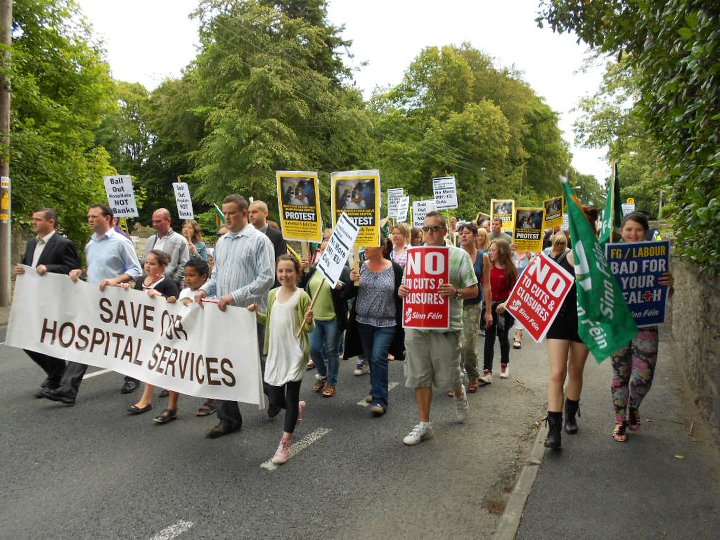
This is a version of the text of a leaflet distributed by the Save Loughlinstown A&E Campaign.
For a longer analysis of the health system from the WSM please see our pamhlet "Towards a Cure" :
St.Collumcilles 24-hour A&E in Loughlinstown due to close on 1st of November:
Don't let it happen!
Film Night: “Listen to Venezuela” Thursday 8th Sept, 8 pm at Solidarity Books
The film “Listen To Venezuela" has been described as,
"... taking the viewer into a contemporary revolution and extraordinary experiment in radical democracy and social justice. In Venezuela, ordinary people have rejected the savage neo-liberal capitalism that has been imposed the world over. In the west, democracy has been drained of any substantive connection with popular power and accountability over the powerful.
The Two Octobers (1927) by Piotr Archinov
The victorious revolution of the workers and peasants in 1917 was legally established in the Bolshevik calendar as the October Revolution. There is sane truth in this, but it is not entirely exact. In October 1917 the workers and peasants of Russia surmounted a colossal obstacle to the development of their Revolution. They abolished the nominal power of the capitalist class, but even before that they achieved something of equal revolutionary importance and perhaps even more fundamental.
Galway sees Day of action against Fine Gael think-in
The Fine Gael party was confronted with angry scenes at not one but two different blockades during a meeting of the parliamentary party in Galway city yesterday. Taoiseach Enda Kenny and his cabinet were attending their pre-budget think-in at the luxury Radisson hotel when some 30 students from the NUIG Free Education for Everyone (FEE) group and the Students’ Union blockaded the entrance in protest at the government’s policy of education cuts, registration fee increases and the ever-looming prospect of full fees. They were joined by two dozen members of the Save Roscommon Hospital Alliance who were equally intent on showing the Fine Gael party what they think of their callous indifference to the welfare of the working class.
Back to school for the Eurozone as the Greek deal collapses

Here we are at the end of the Summer and it’s time for the politicians and bureaucrats of the Eurozone to come back to the office and take a look at what’s lurking in their in-trays. By the same token, it’s also time for all of us interested in fighting back against a Europe of Austerity, to take stock of the lie of the land.
National Organising Meeting of the Anti Household & Water Tax Campaign
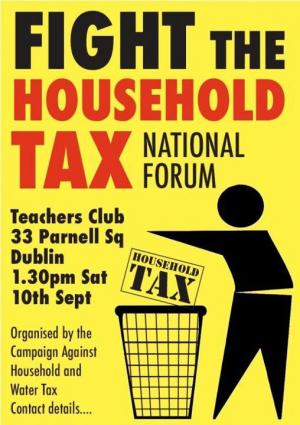 The €100 household charge annouced by the government comes into effect on 1st January 2012. It will be the first step in the governments plans to implement a fully fledged property and water tax by 2014 that could be around €1,200 according to one government economic advisor.
The €100 household charge annouced by the government comes into effect on 1st January 2012. It will be the first step in the governments plans to implement a fully fledged property and water tax by 2014 that could be around €1,200 according to one government economic advisor.
A Wee Black Booke of Belfast Anarchism (1867-1973)
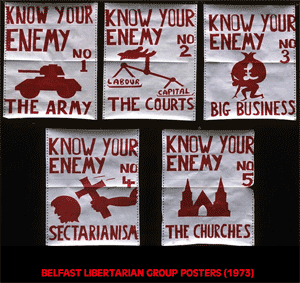 A Wee Black Booke of Belfast Anarchism (1867-1973)
A Wee Black Booke of Belfast Anarchism (1867-1973)
by Máirtín Ó Catháin
Contents
Introduction
Anarchism in an Irish and Ulster Context
The Nineteenth Century
The Early Twentieth Century
The Later Twentieth Century
Conclusion
Bibliography
Introduction to the wee black booke
Had the tabloids been taken at face value, many would have us believe that ‘anarchy’ reigned in Belfast on a regular basis over the past thirty to forty years. Unfortunately, that was not the case. However, the equation of anarchy with violence is nothing new and the word continues to be misapplied in almost every context from the chimpanzee house at Belfast Zoo to the streets of Iraq. Partly this is ignorance, partly laziness, and partly deliberate and malicious misapplication by politicians and the media.
Anarchism in an Irish and Ulster Context
It was a great pioneer of labourism in the north, Hugh Gemmell, who once exhorted fellow workers here to have two chief loyalties - loyalty to yourself and loyalty to your class. Gemmell was about as far as any old Northern Ireland Labour Party man could be from anarchism, but his note on loyalty is a not inauspicious place to begin a discussion on anarchism in Belfast.
The Nineteenth Century Irish Anarchism
Ireland, more than most countries in nineteenth century Europe, had a sizeable rate of emigration, between 1801 and 1921, for example, it is estimated that the population declined by 8 million.(1) As it had a bearing on almost every aspect of life it necessarily also affected political movements on the island, and contributed significantly to political movements elsewhere in the world where Irish emigrants settled.
Belfast anarchism in the Early Twentieth Century
It was not until the early twentieth century that an anarchist group was established in Belfast. Although we have little information on anarchists elsewhere on the island, it seems entirely possible that this was the first specifically anarchist group north or south. It emerged in a time of rising militancy, though not working class militancy, and when communal relations were especially strained, and proceeded from the propagandist labours of two remarkable Scottish anarchists. One of these individuals, John or ‘wee’ McAra, as he was also known, is a subject in this chapter.
Belfast anarchism in the Later Twentieth Century
If Captain Jack White DSO, CNT, was the first of the great individual characters of northern anarchism, those that followed soon after into the later twentieth century were every bit as unique. ‘Slumdom’ Jack McMullen and John McGuffin were not merely products of their time and social circumstances, but transcended the context into which they were born and the politics of their generation. They were in every sense truly dynamic libertarians whose politics speak to us of a far greater and more diverse political culture in Belfast than we have hitherto been led to believe. They also have in common a type of writing whose style approximates to a combination of Emile Zola and Spike Milligan. This makes both individuals fascinating to read though at times perplexing, and it is their writing which marks them out as much as their activism.
Conclusion to the Wee Black Booke of Belfast Anarchism
Anyone looking for a rogue’s gallery or general litany of scallywags in this short history of Belfast anarchists will be disappointed. It is a story of small movements and peripheral figures gathered together over many years and presented to you, the reader, as an account of how Belfast produced and received anarchist activists. It is uneven in places, sketchy on context, and optimistic in analysis.
Bibliography of the Wee Black Booke of Belfast Anarchism
- Newspapers
- Official papers
- Books and journals
- Interviews and correspondence
Newspapers
The Anarchist (Glasgow)
Belfast News Letter
Belfast Telegraph
Freedom
Irish News
Why we must organise to defeat the Household Tax
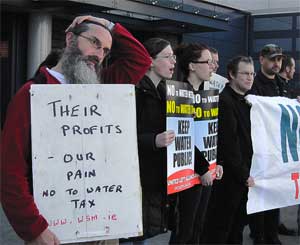 The EU and IMF, enabled and supported by our Fine Gael/Labour Government, are imposing a new regressive tax on all of our homes. This tax will take no account of the ability to pay and will almost certainly move in only one direction (upwards) over the years once it is introduced.
The EU and IMF, enabled and supported by our Fine Gael/Labour Government, are imposing a new regressive tax on all of our homes. This tax will take no account of the ability to pay and will almost certainly move in only one direction (upwards) over the years once it is introduced.
The History of Belfast anarchism
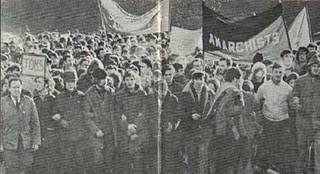
Historian Mairtin O Cathain’s ‘Wee Black Booke’ has now been added to our archive for you to read or download. In it he pulls together reports of anarchism in and around Belfast in the years from 1867 to 1973. With no local movement for much of this period, the pamphlet looks at some individuals whose political activity merited mention in the media of the time. O Cathain’s work stops before the emergence in the late 1970s of the groups from which contemporary anarchist organisations Workers Solidarity Movement and Organise! can trace their roots.
Northern Ireland Workplace related deaths on the rise
The number of workplace related deaths in the north has increased by 50 per cent in the past year, according to latest official figures produced by the Health & Safety Executive’s annual report. To the end of March this nine people tragically lost their lives with six in agriculture, one in construction, one in general manufacturing and one due to carbon-monoxide poisoning. The increase in a casual and flexible labour force, the global erosion of workers rights and conditions are all the end product of a system which places profit before human need.
Successful National Forum sees Campaign against Household Tax gets organised
 Last Saturday (10th September) over 200 people attended the National Organising Meeting of the Anti-Household & Water Tax Campaign. People from over 16 counties arrived during the first session in the afternoon with more arriving later. The meeting was organised to co-ordinate a mass non-payment campaign against the €100 household charge announced by the government to come into effect on 1st January 2012. The campaign sees this as the “first step in the government’s plans to implement a fully fledged property and water tax by 2014 that could be around €1,200 according to one government economic advisor. “ In the long-term, this paves the way for the privatisation of the water supply, as occurred with refuse collection.
Last Saturday (10th September) over 200 people attended the National Organising Meeting of the Anti-Household & Water Tax Campaign. People from over 16 counties arrived during the first session in the afternoon with more arriving later. The meeting was organised to co-ordinate a mass non-payment campaign against the €100 household charge announced by the government to come into effect on 1st January 2012. The campaign sees this as the “first step in the government’s plans to implement a fully fledged property and water tax by 2014 that could be around €1,200 according to one government economic advisor. “ In the long-term, this paves the way for the privatisation of the water supply, as occurred with refuse collection.
Support the Dale Farm families - Put a marker down to stop the racist onslaught against Travellers
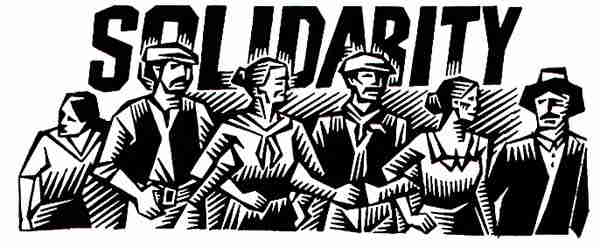 Dale Farm is a halting site which is also the largest concentration of Irish Travellers in Britain, being home to over 1000 people (about 100 families), many of whom are said to have their cultural roots in Rathkeale in Limerick. It was started in the 1960s when a number of families bought the former scrapyard site and Basildon council granted planning permission for 40 houses. This happened in the context of broad progress in race relations and a brief breeze of relative official tolerance for Travellers, epitomised in the liberal-sponsored 1968 Caravan Sites Act. Basildon Council have put aside an £18 million budget to bulldoze the site and forcefully evict the families (a staggering figure when you consider that in 2010 the total UK budget for providing Travellers with halting facilities was less than 30 million).
Dale Farm is a halting site which is also the largest concentration of Irish Travellers in Britain, being home to over 1000 people (about 100 families), many of whom are said to have their cultural roots in Rathkeale in Limerick. It was started in the 1960s when a number of families bought the former scrapyard site and Basildon council granted planning permission for 40 houses. This happened in the context of broad progress in race relations and a brief breeze of relative official tolerance for Travellers, epitomised in the liberal-sponsored 1968 Caravan Sites Act. Basildon Council have put aside an £18 million budget to bulldoze the site and forcefully evict the families (a staggering figure when you consider that in 2010 the total UK budget for providing Travellers with halting facilities was less than 30 million).

